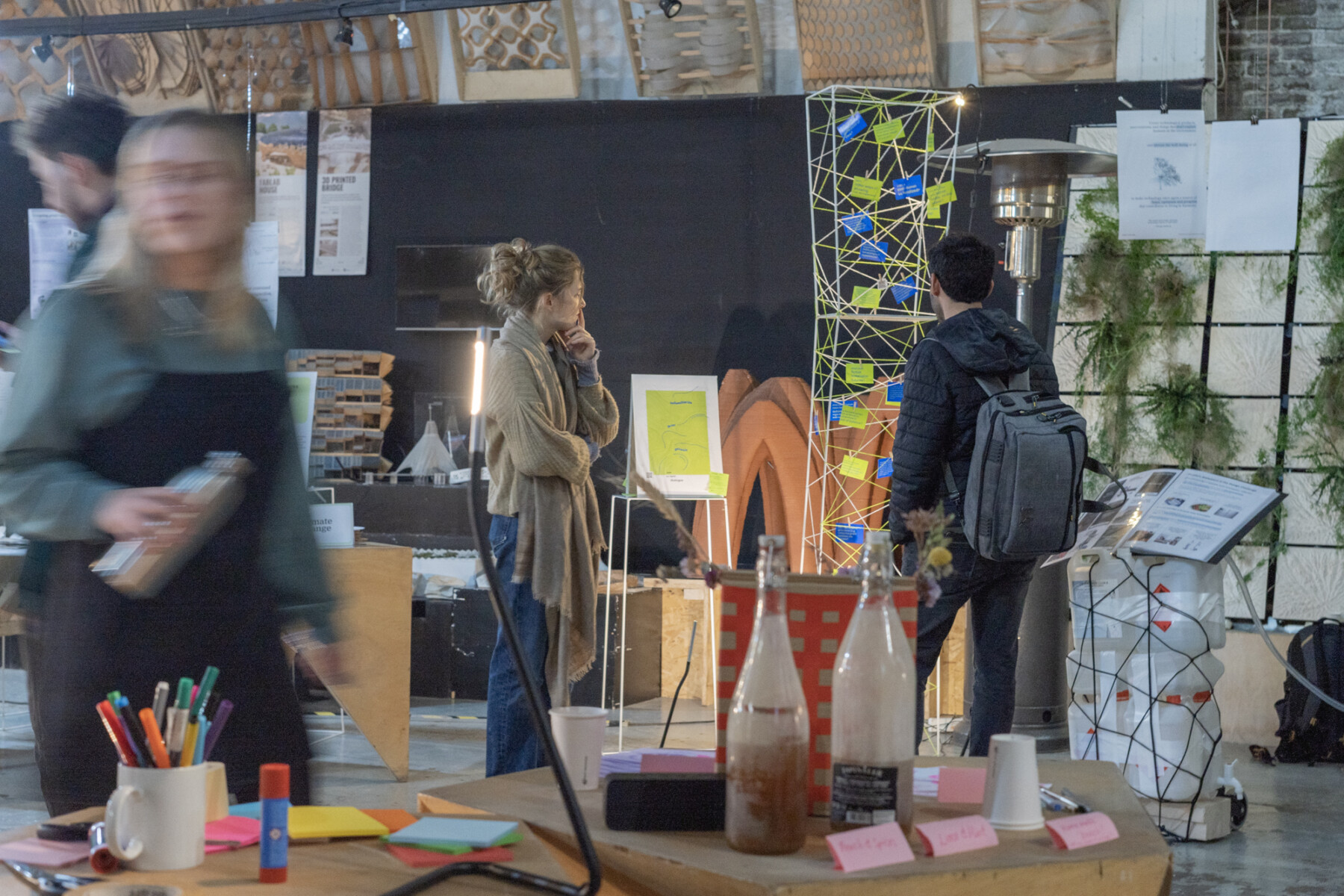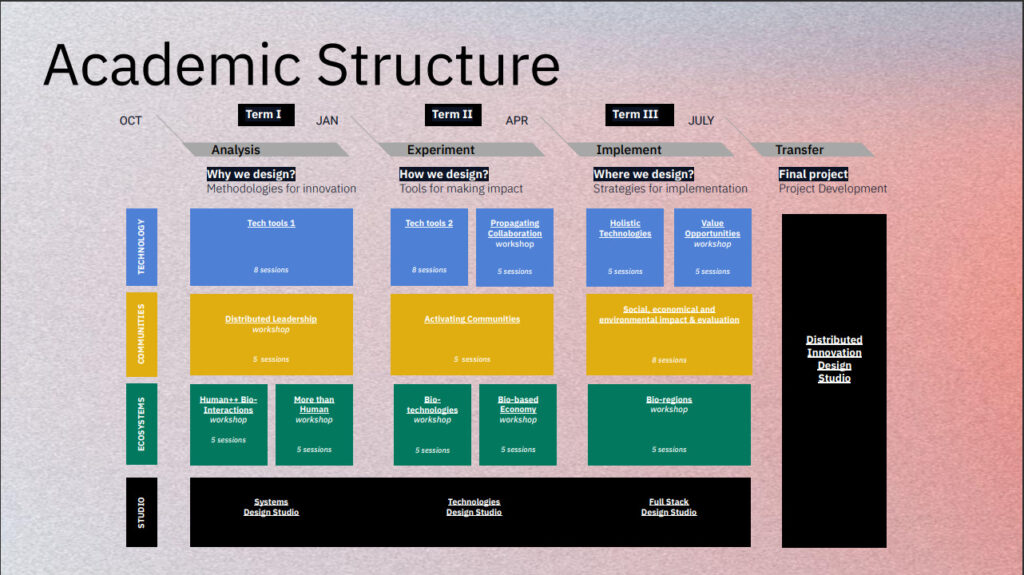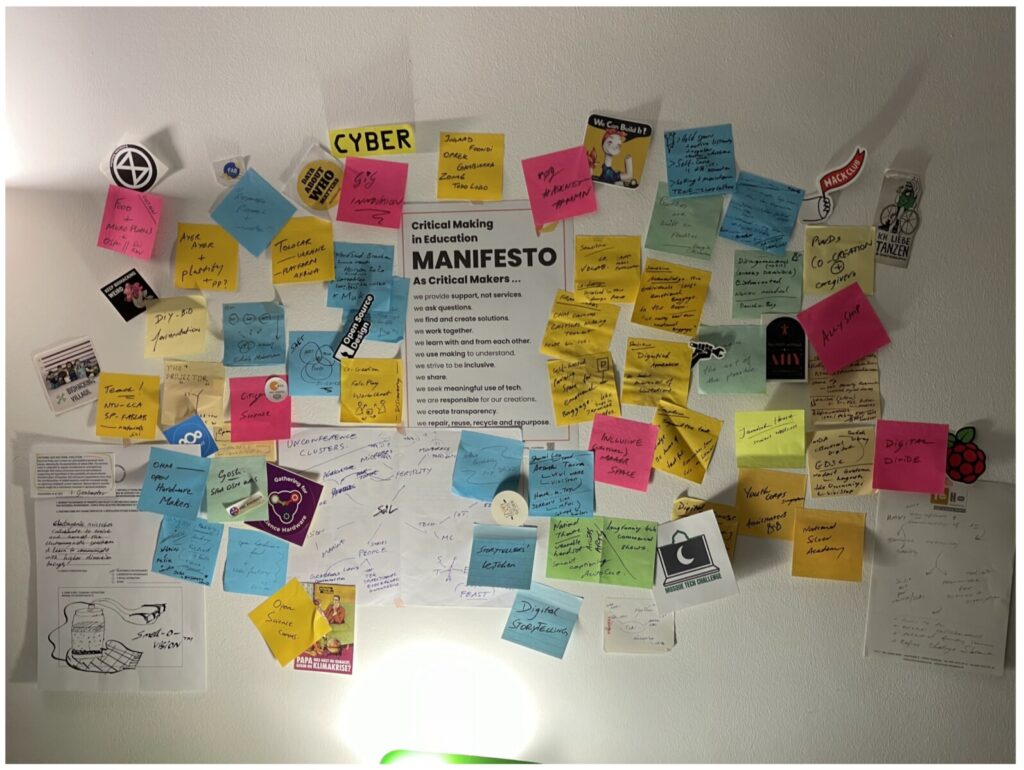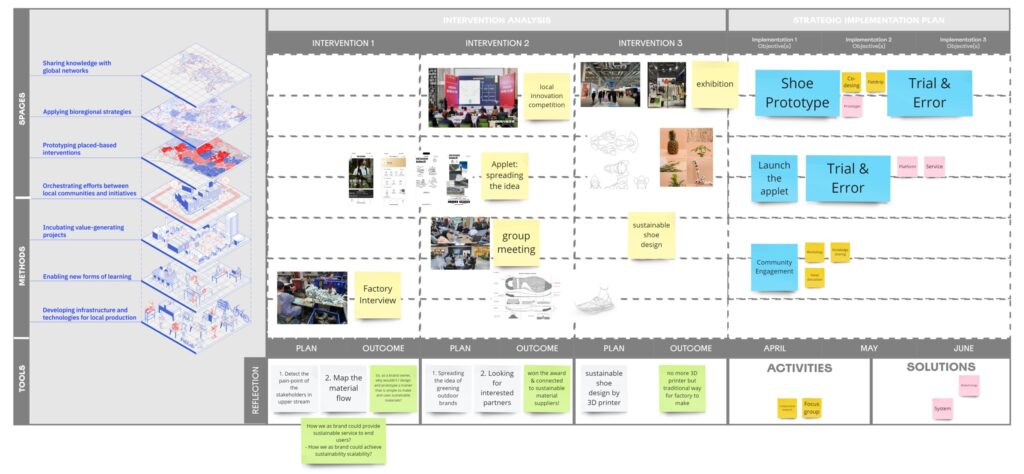
Design for planetary crisis
Discover how MDDI approaches the key considerations for designing for planetary well-being
Design must adopt a new role in addressing the constellation of planetary crises caused by the current industrial model, which originally elevated design to a revered discipline. Design education, traditionally rooted in colonial foundations and globalized ideals, needs to shift towards a more integrated approach. This shift involves reimagining processes to reconfigure the relationship between humans and natural ecosystems and developing new methodologies to learn and understand how to design from and for diverse contexts.
Envisioning regenerative futures for productive cities requires maintaining atoms on a local scale in bioregions through distributed innovation processes. These processes will enable urbanization to become restorative and regenerative, moving bits of information on a planetary scale. This vision aligns with the Fab City global initiative – conceived between Barcelona and Boston – which proposes a new production paradigm. Instead of atoms traveling thousands of kilometers to reach our hands and stomachs, they would mostly circulate locally.
To support this paradigm shift, the Fab City Full Stack framework helps cities and regions to transition to this new production paradigm using a multiscale and ecosystemic approach. It outlines how the systemic change from Product In — Trash Out (PIDO) to Data In — Data Out (DIDO) can be applied at the citizen, city, and global levels, enabled by shared values and physical infrastructure. The Full Stack assists cities in defining their own Strategic Action Plan that reflects their local community and bioregion.
The full stack framework as a methodological tool
At the core of the Master in Design for Distributed Innovations (MDDI) program curriculum is the studio class. It plays a crucial role in the development of projects and achieving their learning objectives and graduate profiles. Faculty and classmates can share knowledge and experience during the studio, forming a fertile learning ecosystem between faculty, students and invitees.
Studio is a project-based class where students develop their projects by exploring design opportunities and incorporating the knowledge acquired in other seminars and workshops. Students explore design opportunities, receive feedback from other classmates, and build a strong foundation for their careers through this program.
The studio methodology is based on the Fab City Full Stack, which aims to provide the Fab City Global Initiative with an operation plan to translate the Product In – Trash Out (PITO) paradigm into a new Data In – Data Out (DIDO) paradigm.

The studio methodology is structured in four phases, the first on the analysis of a certain territory and its context, the second on experimentation, design and work with the local community, the third on the implementation of initiatives and their evaluation of impact through the generation of metrics, and the final project development were all the previous concepts are transferred. These four phases represent a new approach towards distributed innovation in a planetary crisis scenario.
Phase 1: Analysis
Where traditional approaches to urban innovation won’t cut it anymore
In this term, the Fab City Full Stack is used as an analytical tool to identify, understand, and relate local communities and territorial contexts and their systemic relations with their regions and planet to detect specific areas of interventions.
Students develop a foundational understanding of the implications of design and its relationship with natural, technological and social ecosystems. They explore the analysis of local contexts and opportunities. For instance, the program trains students to use the systems design studio, a tool developed based on the concepts of the Fab City Full Stack, to solve local problems.
The systems design studio supports multi-scalar analysis of local contexts based on these scales: Home, Labs, Neighbourhood, Cities, Regions and Bioregions. Through this process, students gain a deep understanding of the environments in which they learn and operate. This empowers students with knowledge of their ecosystems, enabling the development of solutions to address local challenges effectively.
Furthermore, students have access to the Full Stack matrix, which helps them connect their research to the Fab City Full Stack. Beginning with the current state of their local contexts, students develop a prompt for their desired state. This prompt serves as a basis for creating an AI-generated image that represents their envisioned future. In the final step of the matrix, students craft a strategic working plan with a map of at least four actionable interventions and their corresponding objectives for project execution.

Phase 2: Experimentation
Design digital, biological and community-based interventions
In the second phase, students explore different design solutions by considering local material resources and bio and digital technologies and incorporating local communities in an active role. Students are equipped with technical skills to develop sustainable and innovative solutions based on the reconfiguration of technology, social dynamics and resources. The focus is on developing shared urban and territorial strategies, cultivating networks of communities and cities, based on bio-technologies, bio and digital fabrication, bio interactions and blockchain.

Phase 3: Implementation
Metrics for Social, Economical and Environmental impact
During our recent round table discussion, Leonora Grcheva emphasized the need to reconsider how we measure and value economic growth. She highlighted that conventional metrics like GDP growth fail to adequately gauge success for industries, communities, cities, countries, and regions. This outdated economic measurement framework does not address the complex social and ecological challenges of the 21st century. She stressed that pursuing growth does not lead to equitable outcomes. Instead, cities should adopt distributive designs that share value and opportunity broadly, fostering regeneration.
Building on these insights, the Fab City Full Stack is applied in the third phase as an implementation tool that promotes the global scalability of projects and their positive planetary impacts. This framework guides students in creating solutions that align with the goals of distributive design and regeneration.
Specific objectives for this term include defining implementation strategies that involve local communities, promoting knowledge sharing, and supporting bioregional development. Students will also create a distributed economic model based on value exchange and implement a local final project while measuring its local and global impact. These objectives aim to equip students with the skills and knowledge to develop sustainable and scalable solutions.
Phase 4: Final Project Consolidation
During the last phase, students develop and implement a final project in collaboration with their node ecosystem. The projects are positive solutions that integrate the local ecosystem and community through technology, service or model.
Students transform their working prototypes into fully realized products. This involves creating marketing materials, finalizing technology designs, and developing comprehensive business plans. During this phase, students participate in mentoring sessions and attend lectures from global experts who provide insights and guidance. This support helps students refine their projects, ensuring they are market-ready and capable of making a significant impact.
In our program, students have access to design tools used to understand local contexts, apply the Fab City Full Stack principles, and identify actionable interventions. This process involves analyzing specific challenges and opportunities, as well as identifying ways to integrate the Full Stack framework into existing urban systems, policies, and community initiatives. Students are empowered to contribute to and support transformations occurring in their communities.
MDDI supports the exploration of transformative design processes within the context of Fab Cities and other localities, appealing to a wide range of stakeholders involved in city innovation, governance, and urban development. It inspires a shift towards more inclusive, sustainable, and visionary approaches to addressing the challenges of the 21st century.
The 4th application period for the MDDI academic year 2024/25 is now open until May 31, 2024. Apply now!